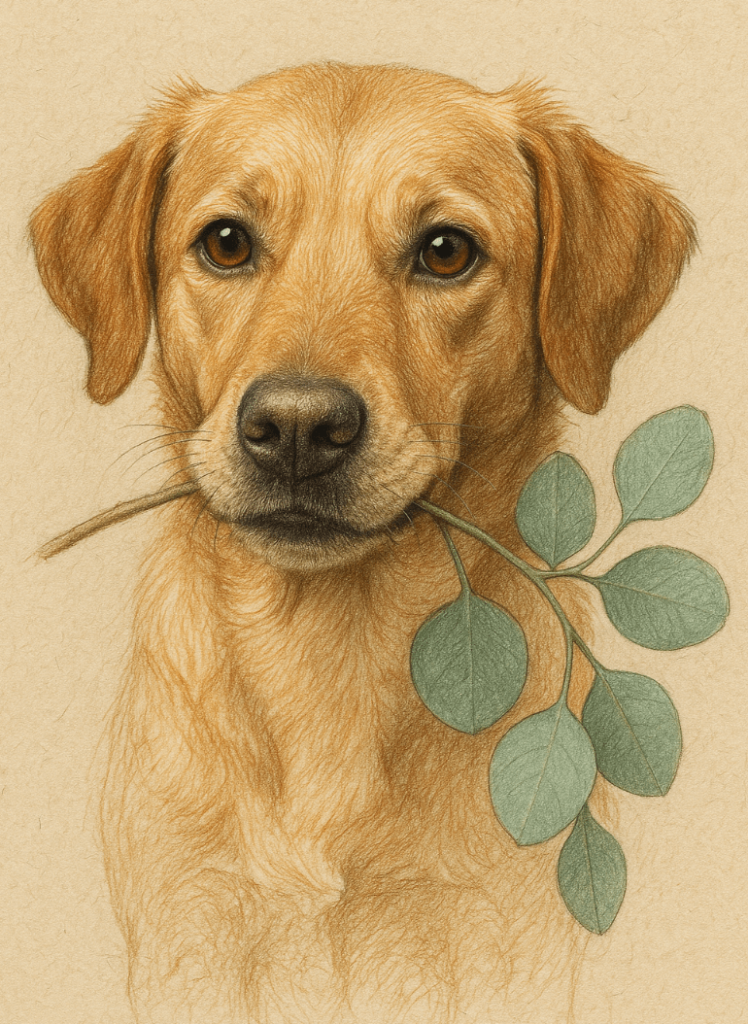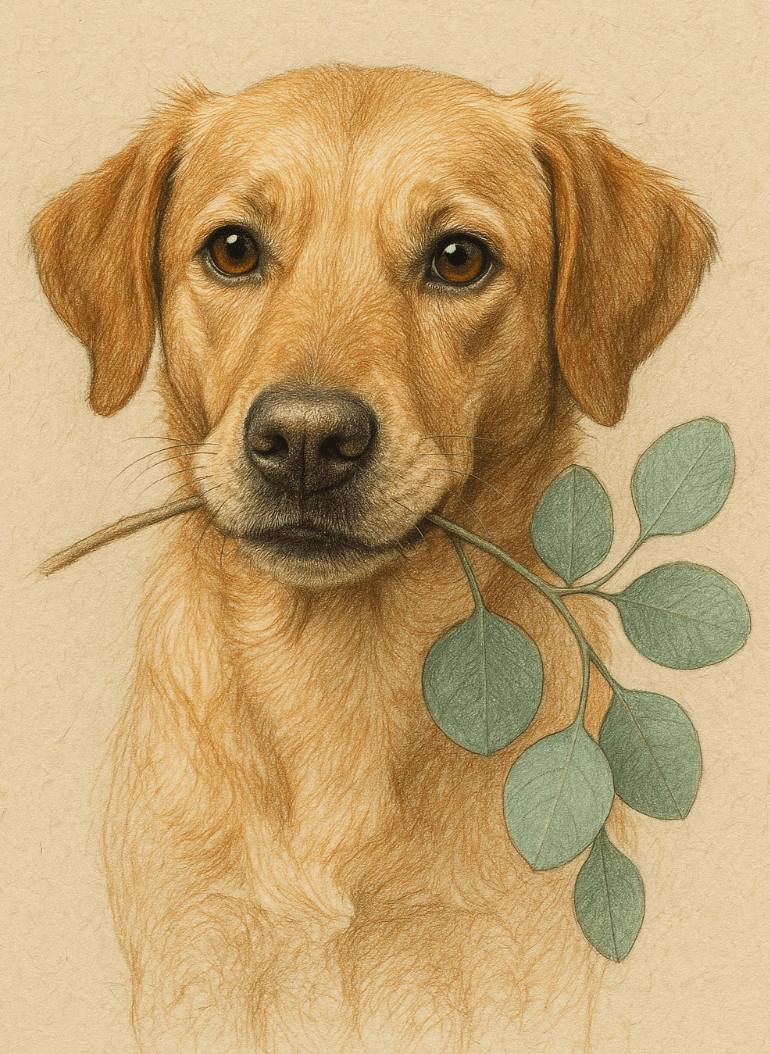Can Dogs Eat Eucalyptus?
Eucalyptus is a popular plant known for its aromatic leaves and numerous uses in essential oils, aromatherapy, and even household cleaning products. While it has many benefits for humans, pet owners often wonder whether eucalyptus is safe for their furry companions. If you’ve ever asked yourself, “Can dogs eat eucalyptus?”—the answer isn’t as straightforward as you might think. While small amounts of eucalyptus may not always cause harm, this plant contains compounds that can be toxic to dogs if ingested in large quantities or improperly handled. In this blog post, we’ll explore everything you need to know about eucalyptus and dogs, including potential risks, safer alternatives, and tips for keeping your pup safe.
Potential Risks of Eucalyptus for Dogs
While eucalyptus has many practical uses, it can pose significant risks to dogs if they come into contact with or ingest it. Understanding these dangers is crucial for ensuring your pet’s safety.
Toxic Compounds:
Eucalyptus contains eucalyptol and other essential oils that can irritate a dog’s digestive system and nervous system if consumed.Gastrointestinal Upset:
Ingesting eucalyptus leaves or oils can lead to vomiting, diarrhea, and abdominal pain in dogs.Respiratory Issues:
Inhalation of concentrated eucalyptus oil vapors may cause breathing difficulties or irritation in sensitive dogs.Liver Toxicity:
Prolonged exposure or ingestion of eucalyptus can strain the liver, especially in smaller or more vulnerable breeds.Skin Irritation:
Direct contact with eucalyptus oils or leaves may cause redness, itching, or rashes on a dog’s skin.
These risks highlight why caution is essential when introducing eucalyptus into your home or yard if you have a curious canine companion.
Signs Your Dog May Have Ingested Eucalyptus
If your dog accidentally consumes eucalyptus, it’s important to recognize the symptoms early so you can take action. Here are some common signs of eucalyptus toxicity in dogs.
Excessive Drooling:
Drooling more than usual may indicate oral irritation or nausea caused by eucalyptus ingestion.Lethargy or Weakness:
A sudden lack of energy or difficulty moving could signal poisoning or organ stress.Vomiting or Diarrhea:
These gastrointestinal symptoms are among the first signs of eucalyptus toxicity.Difficulty Breathing:
Labored breathing or coughing may occur if your dog inhales eucalyptus oil or particles.Loss of Coordination:
Stumbling, confusion, or unsteady movements can indicate neurological effects from eucalyptus exposure.
If you notice any of these symptoms, contact your veterinarian immediately to ensure your dog receives proper care.
Check this guide 👉Can Dogs Eat Hydrangeas? Best 7 Expert Tips!
Check this guide 👉Can Dogs Eat Allulose? Best 7 Expert Tips!
Check this guide 👉Can Dogs Eat Margarine? Best 7 Expert Tips!

Safe Alternatives to Eucalyptus | Risks of Eucalyptus Exposure |
|---|---|
Lavender (in moderation) | Gastrointestinal upset |
Chamomile for calming effects | Respiratory distress |
Mint (pet-safe varieties only) | Skin irritation or allergic reactions |
Rosemary (small amounts) | Liver toxicity with prolonged exposure |
Cinnamon (non-essential oil form) | Neurological symptoms like seizures |
How to Keep Your Dog Safe Around Eucalyptus
Preventing accidental exposure to eucalyptus is key to protecting your dog’s health. Follow these tips to minimize risks in your home and garden.
Avoid Using Eucalyptus Oils:
Keep essential oils containing eucalyptus out of reach and avoid diffusing them in areas where your dog spends time.Secure Houseplants:
If you have eucalyptus plants indoors, place them in areas inaccessible to your dog, such as high shelves.Supervise Outdoor Time:
Watch your dog closely during walks or playtime in areas where eucalyptus trees grow naturally.Check Pet Products Carefully:
Some pet grooming products may include eucalyptus; read labels thoroughly before use.Educate Family Members:
Ensure everyone in your household understands the risks of eucalyptus and knows how to keep your dog safe.
By taking these precautions, you can create a safer environment for your dog while still enjoying the benefits of eucalyptus yourself.
What to Do If Your Dog Eats Eucalyptus
Accidents happen, and if your dog ingests eucalyptus, acting quickly can make all the difference. Here’s what you should do in such a situation.
Stay Calm and Assess the Situation:
Try to determine how much eucalyptus your dog consumed and whether it was leaves, oil, or another form.Call Your Veterinarian:
Contact your vet immediately for advice tailored to your dog’s size, breed, and condition.Do Not Induce Vomiting Without Guidance:
Attempting to make your dog vomit at home can sometimes worsen the situation; always consult a professional first.Provide Fresh Water:
Offer clean water to help dilute any toxins in your dog’s system, but don’t force them to drink.Monitor Symptoms Closely:
Keep an eye on your dog for any changes in behavior or worsening symptoms while waiting for veterinary care.
Quick and informed action can help mitigate the effects of eucalyptus ingestion and ensure your dog recovers safely.
Common Misconceptions About Eucalyptus and Dogs
Several myths surround the use of eucalyptus around pets, leading to misunderstandings about its safety. Clarifying these misconceptions helps keep your dog safer.
Myth: Small Amounts Are Always Safe:
Even small amounts of eucalyptus oil or leaves can harm sensitive dogs, depending on their size and health.Myth: Diffusers Are Harmless:
Essential oil diffusers can release harmful vapors that irritate a dog’s respiratory system, especially in enclosed spaces.Myth: All Natural Plants Are Safe for Pets:
Just because a plant is natural doesn’t mean it’s non-toxic; eucalyptus is a prime example of this.Myth: Dogs Know What’s Poisonous:
Dogs lack the ability to distinguish between safe and toxic plants, making supervision essential.Myth: External Use Is Always Safe:
Applying eucalyptus-based products to your dog’s fur can still cause skin irritation or ingestion during grooming.
Understanding the truth behind these myths ensures better protection for your dog.
Safer Alternatives to Eucalyptus for Aromatherapy
If you love the idea of aromatherapy but want to keep your dog safe, consider these pet-friendly alternatives that won’t compromise their health.
Lavender (Diluted):
Known for its calming properties, diluted lavender oil is safe for dogs when used sparingly and under supervision.Chamomile:
This gentle herb promotes relaxation and can be used in sprays or sachets around the house.Valerian Root:
Often used in herbal remedies, valerian root provides soothing effects without harming pets.Pet-Specific Essential Oil Blends:
Some companies offer blends specifically formulated for dogs, ensuring safety and efficacy.Fresh Herbs Like Basil or Parsley:
These herbs add a pleasant aroma to your home without posing risks to your dog.
Switching to these alternatives allows you to enjoy aromatherapy while keeping your dog’s well-being in mind.
Tips for Creating a Pet-Friendly Garden
If you’re a plant enthusiast and a dog owner, designing a pet-friendly garden is essential to prevent accidental exposure to toxic plants like eucalyptus.
Choose Non-Toxic Plants:
Opt for dog-safe plants like marigolds, sunflowers, or snapdragons to brighten your garden without risk.Use Raised Beds or Fences:
Elevating plants or creating barriers keeps curious dogs away from potentially harmful foliage.Avoid Mulch with Cocoa Beans:
Cocoa bean mulch contains theobromine, which is toxic to dogs; opt for cedar or pine mulch instead.Install Chew Deterrents:
Sprays or barriers designed to deter chewing can protect both your plants and your dog.Regularly Inspect Your Yard:
Check for fallen leaves, seeds, or debris from toxic plants and remove them promptly.
A thoughtful approach to gardening ensures harmony between your love for plants and your commitment to your dog’s safety.
Frequently Asked Questions About Dogs and Eucalyptus
Is eucalyptus oil safe for dogs?
No, eucalyptus oil is highly concentrated and toxic to dogs, even in small amounts. Avoid using it around pets.
Can dogs sniff eucalyptus safely?
While brief exposure to eucalyptus scent is unlikely to harm most dogs, prolonged inhalation of strong vapors can irritate their respiratory system.
Are there any safe plants similar to eucalyptus?
Yes, pet-safe plants like lavender (in moderation) or chamomile can provide aromatic benefits without posing risks.
What should I do if my dog chews a eucalyptus leaf?
Remove the leaf immediately, monitor your dog for symptoms, and contact your veterinarian for further guidance.
Can eucalyptus kill a dog?
In severe cases of ingestion or prolonged exposure, eucalyptus toxicity can be life-threatening. Always seek veterinary care if you suspect poisoning.
Prioritizing Your Dog’s Safety Around Eucalyptus
While eucalyptus offers many benefits for humans, its potential risks to dogs cannot be ignored. By understanding the dangers, recognizing symptoms of toxicity, and taking preventive measures, you can protect your furry friend from harm. Remember, your dog relies on you to create a safe and nurturing environment—so always prioritize their well-being over convenience or aesthetics. With vigilance and care, you can enjoy the beauty of eucalyptus while ensuring your pup stays happy and healthy.
Do Cats Have Taste Buds? Best 7 Expert Tips! – Discover how cats experience flavors and why their taste is so unique.
Do Dogs Have Taste Buds? Best 7 Expert Tips! – Discover how dogs experience taste, their preferences, and what it means for their diet and health.
Can Cats Taste Sweet? Best 7 Expert Tips! – Discover why cats can’t taste sweetness, how it affects their diet, and tips to keep them healthy and happy.
Can Dogs Taste Sweet? Best 7 Expert Tips! – Discover how dogs perceive sweetness, which foods are safe, and tips to manage their sweet cravings responsibly.





